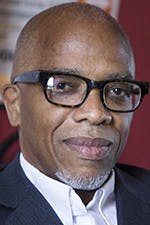I like the Martin Luther King, Jr. holiday. It offers evidence of what America has overcome (thus far) as well as instruction for the continuous battle ahead. And make no mistake about it, the social, political and practical movement forward is indeed a fight that black Americans, Latin Americans, gay folks, women and progressive folks of all stripes are engaged in. But the King day itself has proven to be a great time of action, reflection and a celebration of the King ideals of love, peace, equality and civic duty. It is an optimistic day, pointing to greater possibilities for America. And who does not like feeling good sometimes?
One day in the middle of last semester I was parking in a lot near the stadium. Some of the spots were fenced off for construction or demolition at the old Shaw Lane power plant. I was able to squeeze into a spot next to the fenced off area. As I got out of my car and gathered my things, I touched the fence while maneuvering my way out of the narrow passage between the fence and my car.
A white man working on the top of the power plant yelled down at me, “Hey! Don’t move that fence! If that thing comes down, there’ll be trouble.”
I yelled back, “I wasn’t moving it. I’m just getting out of my car.”
He responded, “Just don’t move that fence!”
I stared up at him for a moment. “Don’t talk to me like that. Don’t you ever talk to me like that.”
The man was quiet and then his tone softened as much as a yell can soften. “Please be careful around the fence.”
Before walking away I said, “Thank you.”
It was probably the most unpleasant thank you that I have ever said to anyone. In the few minutes it took me to walk to my office one thought played over and over in my mind, I hate white men…I hate white men…I hate white men…
What an uplifting story for MLK Day, right?
At the moment of that parking lot exchange, I had no idea of that man’s true intent. From tone, words and what I could see of his face I perceived some kind of veiled racial intent being directed at me. It took me a millisecond to come to that conclusion. And then as with all racial slights, actual or perceived– being stopped by police, followed in stores, or the only black face in the room of any number of university meetings — it took me another millisecond to decide how to respond. Should I let it slide or fall back on fake niceties? Ignore it or simply go off on him? Employ a well-known strategy of black public over-articulation or just hand it all over to Jesus, Allah or go into my Buddhist chant?
My part of the angry exchange served as a kind of psychic release. It felt really good. In the aftermath of the moment, my thought, I hate white men, felt justified. After psychic release and feeling so correct, that is when the hard part started.
The King ideal is political, social and spiritual. It is personal. And it is really, really difficult to live up to. I am a black man who identifies with black struggle and triumph. It is a model of American struggle and triumph to be admired and celebrated. All people and groups should have and should expect to have the rights, the equality and the freedoms that I expect for myself.
As a father, a teacher and a member of various communities, I want my children, my students and my community members to have a voice. I want them to act and to be activists on behalf of themselves and others. I want people to have strength of faith in spite of the odds. I believe in and want to model the ideals of love, peace, equality and civic duty, very much like Martin Luther King, Jr. and the Civil Rights movement as a whole.
Could the thought, I hate white men, and the justified, satisfied feeling of that moment fit in with my own ideals which had been informed by the ideals of Martin Luther King, Jr. among others?
Of course, the answer was no, but sometimes in particular moments with our particular American racial history such honorable ideals are difficult to keep in mind.
The sacrifice and enduring legacy of Rev. Dr. King, Jr. challenges me to either live by those ideals or to stop claiming them as my own.
The spirit of the King holiday is important. Embodying it during the remaining 364 days is the real challenge. As communities, as institutions or in the confines of our own minds and perceptions we need to act on and live by that spirit of Rev. Martin Luther King, Jr. everyday. It might be the most difficult thing that we will ever do. And it will feel really good.
Jeffrey C. Wray is an associate professor of English film studies. Reach him at wrayj@msu.edu.
Support student media!
Please consider donating to The State News and help fund the future of journalism.
Discussion
Share and discuss “Following Martin Luther King Jr.’s ideals is a challenge worth accepting” on social media.







